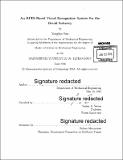An RFID-based visual recognition system for the retail industry
Author(s)
Sun, Yongbin, Ph. D. Massachusetts Institute of Technology
DownloadFull printable version (8.720Mb)
Alternative title
Radio-frequency identification-based visual recognition system for the retail industry
Other Contributors
Massachusetts Institute of Technology. Department of Mechanical Engineering.
Advisor
Sanjay E. Sarma.
Terms of use
Metadata
Show full item recordAbstract
In this thesis, I aim to build an accurate fine-grained retail product recognition system for improving customer in-store shopping experience. To achieve high accuracy, I developed a two-phase visual recognition scheme to identify the viewed retail product by verifying different types of visual features. The proposed scheme is robust enough to distinguish visually similar products in the tests. However, the computation cost of this scheme increases as the database scale becomes larger since it needs to verify all the products in the database. To improve the computation efficiency, my system integrates RFID as a second data source. By attaching an RFID tag to each product, the RFID reader is able to capture the identity information of surrounding products. The detection results can help reduce the verification scope from the whole database to the detected products only. Hence computation cost is saved. In the experiments, I first tested the recognition accuracy of my visual recognition scheme on a database containing visually similar products for different viewing angles, and my scheme achieved over 97.92% recognition accuracy for horizontal viewpoint variations of less than 30 degree. I then experimentally measured the computation cost of both the original system and the RFID-enhanced system. The computation cost is the processing time to recognize a target product. The RFID-enhanced system speeds up system performance dramatically when the scale of detected surrounding products is small.
Description
Thesis: S.M., Massachusetts Institute of Technology, Department of Mechanical Engineering, 2016. Cataloged from PDF version of thesis. Includes bibliographical references (pages 63-67).
Date issued
2016Department
Massachusetts Institute of Technology. Department of Mechanical EngineeringPublisher
Massachusetts Institute of Technology
Keywords
Mechanical Engineering.